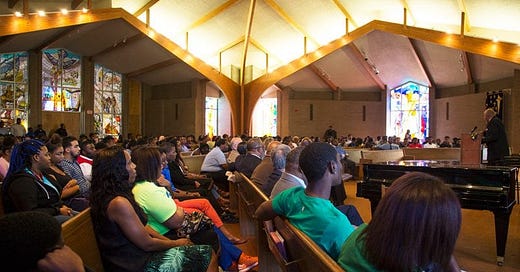This was the first time in several years that Vaigly Methodistic College had invited a Catholic speaker for morning chapel. The preacher in question came from the radical, dissenting stream of American monasticism that had several times caused papal headaches — but the college chaplain, Dr. Cennick, scarcely understood such nuances, remaining more aware of the morning's ecumenical significance than of any political ramifications. That was why he went out of his way, in giving introductions from the podium, to give a rather too fulsome welcome to "Our speaker today", Sibling Justice, from the convent of Our Lady of Perpetual Grievance.
There had long been Roman Catholic students in Vaigly. Not that many, but enough to make all parties feel good about the fact. In the dim and distant past, Catholic-evangelical relations had been pretty rough — though generally less rough in America than in, say, Ireland or Germany. Better, for sure, than in Latin America. In part, that was because America had long been a Protestant republic; even back in the eighteenth century, a hundred years before Pius IX's intemperance had embarrassed his co-religionists in Britain and Belgium, American Catholics had long been used to beginning sentences with the words "I'm Catholic, but...."
Since the 1960s, however, when Vatican II had re-tooled the Catholic Church to be fit for purpose in the modern world, and taught its adherents to describe Protestants as "separated brethren" rather than as heretics; when the charismatic movement had seduced at least some evangelicals with the thought that the outpouring of the Holy Spirit, rather than a strict adherence to the Westminster Confession or the doctrine of biblical inerrancy, might be the true mark of the presence of God; when the first stirrings of America's Culture Wars had drawn together believers of different cloth in common cause; the American evangelical-Catholic relationship had, in some quarters at least, become a veritable love-in. Almost everywhere, it was marked by an easy-going affection in public and occasional bemused head-scratching in private. To be sure, both sides retained their minority of old-school hostiles — a circumstance which encouraged the rest to be as nice as pie on all occasions and, above all, to avoid embarrassment.
His warm introductories delivered, Dr. Cennick was just stepping back from the lectern when, to his sudden consternation, there could be heard a truculent voice from somewhere among the seats below. "No popery!" The words were not quite shouted, but still loud enough to be heard in an otherwise silent chamber. They came in the unmistakeable, sharp crackle of Vaigly's sole student from Ulster, young Paisley McGonagle.
There was a gasp of embarrassed dismay from most of the platform party at this shocking breach of protocol and good manners. Upon hearing it, a buzz of excited chatter immediately rose from the congregation. Cennick mustered a sharp intake of breath. Then a gulp. Then a decision to return the three paces to the podium, though with no clear idea of what to say when he got there.
He was forestalled — and likely saved — by the speaker. For Sibling Justice was undeterred. Stepping forward to the microphone, the preacher began, "Oh! That's quite all right. Really it is. I am not offended. Not ... at ... all!" After pausing for effect, the crusader intoned: "In fact, I quite agree with this protest. I would hope that most of you understand that we need a more diverse pope. The present pope is a fascist!"
Now the gasp was not confined to the platform. Several broke into applause, but it became hesitant after a few seconds before petering out. By then, others had started to clap, though a little erratically, and the second wave suffered the same fate as the first. The pattern repeated itself several times, before a low buzz of confused chatter resumed.
The fact was that a few were inclined to applaud on hot-Prottish grounds not dissimilar to those of young Paisley's outburst. Yet a glance at the speaker's dress, demeanor, and the usual assortment of self-inflicted facial disfigurements quickly told them that, whatever reasons they might have for booing the pope, they would have little in common with those of the spokesthing for Our Lady of Perpetual Grievance. There was no sense in giving support to all that. Others in the hall had the opposite problem: inclined to cheer any pop at 'the patriarchy', they nevertheless wished to give no succor to hard-boiled fundamentalists and devotees of the King James Bible while they did so. In consequence, all were confused. To cheer? To hiss? And, in the end, the embarrassed silence won
.





